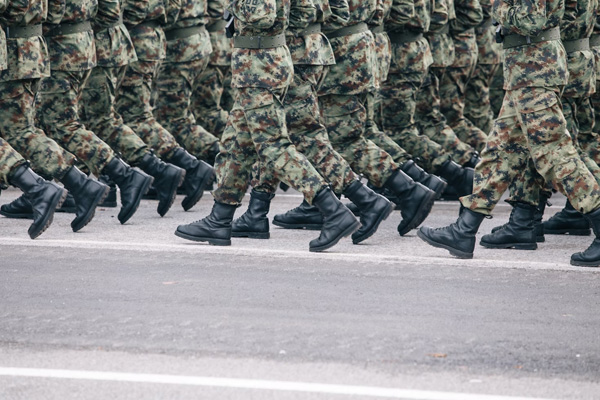North Korean troops arrive in Russia escalating Ukraine conflict

[Image of soldiers marching. Credit to Unsplash]
The North Atlantic Treaty Organization (NATO) has confirmed the arrival of North Korean troops in Russia’s Kursk region, signaling a notable and potentially destabilizing shift in the Ukraine conflict.
This deployment underscores a strategic shift, demonstrating a strengthened alliance between Moscow and Pyongyang that has heightened global concern.
Following recent discussions with South Korean defense officials, NATO Secretary General Mark Rutte described the deployment as a “dangerous expansion” of Russia’s military operations.
NATO has been closely monitoring North Korea’s increasing military aid to Russia, viewing it as a direct challenge to Western efforts to isolate Russia both economically and militarily.
In addition to troops, NATO’s intelligence sources suggest North Korea has been supplying ballistic missiles and substantial ammunition shipments, further strengthening Russia’s combat capabilities against Ukraine.
As the alliance solidifies, North Korea’s direct involvement on the battlefield raises questions about its long-term objectives and potential to escalate global tensions.
Earlier this year, Kim Jong Un and Vladimir Putin signed a military support agreement, formalizing a mutual defense pact that obligates both nations to provide military support in cases of aggression against either party.
Analysts have warned that this unprecedented alignment could suggest that the conflict in Ukraine may be entering a new phase that involves additional actions with unpredictable results.
European leaders swiftly condemned the deployment, with European Commission President Ursula von der Leyen labeling it a “significant escalation” and reiterating the EU's readiness to coordinate a response with NATO and other allies.
The decision is expected to complicate international efforts to negotiate or de-escalate the crisis, as Pyongyang’s involvement threatens to broaden the conflict.
U.S. President Joe Biden described North Korea’s involvement as “very dangerous,” noting that this signals a shift in the regional power dynamics and introduces new security challenges that NATO and its allies must address.
The U.S. Department of Defense estimates that up to 10,000 North Korean troops have arrived in eastern Russia.
Additionally, a South Korean spy agency reported that approximately 1,500 troops are already stationed near Ukraine’s frontlines to support Russia.
Military experts warn that the involvement of North Korean troops complicates the situation for Ukrainian forces, who are now facing stronger Russian defenses and increased resistance.
A senior Ukrainian official suggested that some North Korean units might consist of elite forces, potentially bolstering Russian capabilities for counterattacks in areas of recent Ukrainian advances.
Despite potential obstacles such as language barriers and differing command structures, the deployment of North Korean troops is a symbolic victory for Moscow, showing their growing number of allies willing to resist Western pressures.
Although North Korea has limited combat experience in recent conflicts, their presence highlights Russia's intent to increase its commitment to the ongoing conflict in Ukraine.
Belarusian President Alexander Lukashenko, a close key ally of Vladimir Putin, stated that the deployment signifies a major escalation, hinting at a possible shift toward broader coalition involvement.
Some defense analysts argue that North Korean troops may face issues in cohesive operations within Russian forces due to significant logistical and communication challenges.
Nonetheless, their arrival strengthens Russia’s presence in contested zones, complicating Ukraine’s efforts to reclaim occupied territories.
This deployment signals North Korea’s reorientation towards Russia, potentially seeking leverage on the global stage amidst severe economic sanctions and diplomatic isolation.
By aligning with Russia, North Korea may hope to secure future military and economic advantages, solidifying its standing within a new, emerging axis of resistance against Western influence.
As North Korean troops position themselves in strategic locations, experts emphasize that this intensifies the risks of further destabilization in Eastern Europe, potentially drawing additional countries into direct conflict.
The international community remains on high alert, as this development not only affects the Ukraine war’s trajectory but also presents broader diplomatic and security implications that could reshape future conflict dynamics on a global scale.

- Chaemin Lee / Grade 11
- Saint Paul Academy Daechi

![THE HERALD STUDENT REPORTERS [US]](/assets/images/logo_student_us.png)
![THE HERALD STUDENT REPORTERS [Canada]](/assets/images/logo_student_ca.png)
